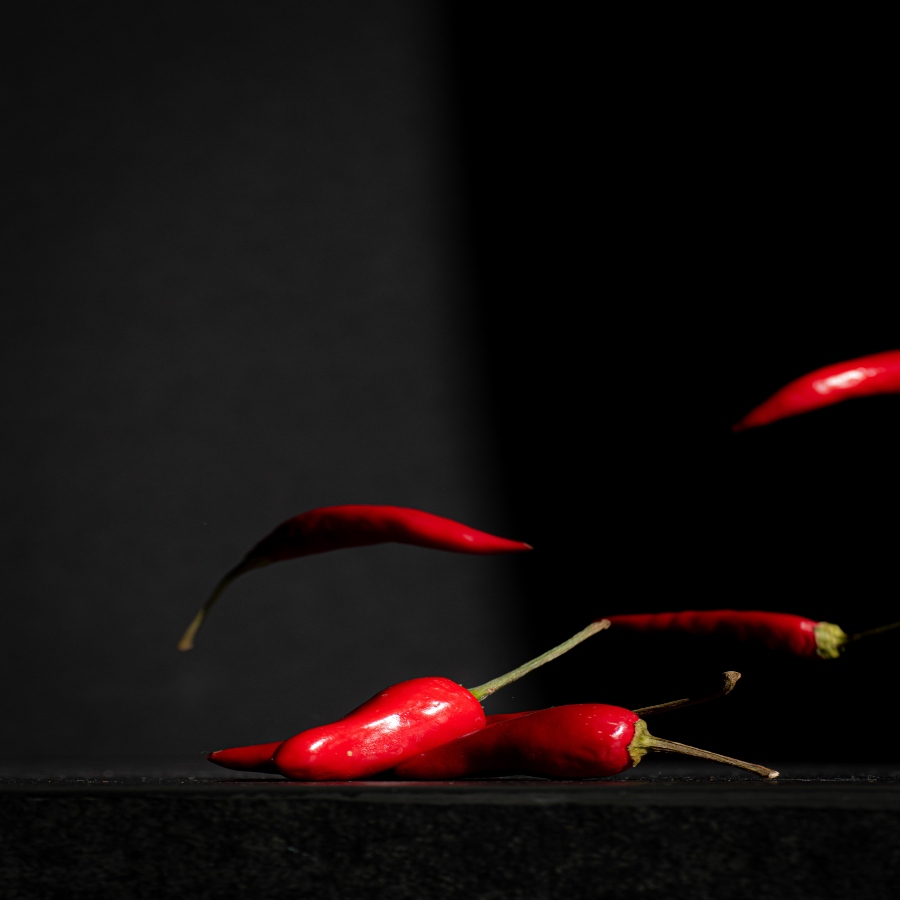When Mamá’s apron catches fire, my first reaction is to grab Mamá’s body and share the fire with her.
Pimientos en nogada is a dish that people eat in México at weddings and important occasions. Mamá is set on making it on our special day since she wants to prove to us, but mostly to herself, that despite her curled fingers and the ache in her knees, she can still cook. The night before the fire, she makes the nogada. She leaves the unpeeled nuts soaking with milk, mashes the nuts with fresh white cheese, a pinch of sugar, cinnamon, salt, and white wine. The mixture, after straining, is fragrant and creamy.
Mamá starts the dish with the fire, a set and steady flame that turns blue at the tips. She puts the pimientos on the stove. “How long on each side?” I ask, half looking at her and half looking at my phone. “You have to look to see,” she says, her bare hands turning the pimiento to the other side. Although they must be hot, she doesn’t say so.
“Mamá!” I yell, far too late, as the fabric of her hand-painted apron she had bought in México D.F. gets consumed by the flame.
Two days later, when we come back from the hospital, the nogada is still sitting on the table with the rest of the pimientos all over the floor, some blackened and some uncooked—the remnants of our kitchen incident, as Mamá would call it. Roberto, my soon-to-be husband, in the rush of paramedics and sirens, hadn’t put the food back in the fridge. I touch my stomach, which is covered in bandages, and think about flies.
Mamá, who rests in bed days after the incident, predicts that rain will appear mid-ceremony and soak us all.
“Rain is a good omen,” I tell her, my fingers covered in the thick white odorless matter I use for her stomach burns.
“How did it feel for you?” she says, trying to sit up after I am done with her stomach. “I didn’t feel it,” I lie while carefully applying the salve to my middle, which is covered in purple blisters. “My skin must have been numb from the pain.”
She turns to the wall, smiling as if she were seeing it for the first time. A flash of the flames engulfing the carefully hand-painted flowers on her apron comes to my head. The same flames that traveled to my cotton shirt.
I had poured a pot of water on both of us. I can still hear the panic in her raspy smoker’s voice. The way that her voice addressed me in one word: “Corre,” her delirious tone convinced me that we could escape the flame.
I removed the blackened apron and her shirt first, afraid that it would get stuck to her skin. My hands acted quickly as howls of pain escaped my mouth.
“The wallpaper. It’s starting to crack,” Mamá says.
I nod without looking. Every night after the fire, the smell of our leathering gets stuck to my nose.
Roberto, who comes to visit Mamá every day, swallowing his I-told-you-so about Mamá in the kitchen, Mamá at the stove, Mamá doing anything, is the first to be against the idea of postponing the wedding.
“I can’t wear the same dress,” I say, thinking about how the corsé will press against my skin.
“We will buy you another one.”
“My mother will not be able to go to the beach. Her skin could get infected.”
“So we marry here. Problem solved,” he says, sitting on the couch and putting his feet up on the table since Mamá is in her room and can’t move to tell him that he is not an animal and he is not in his own house.
I sit on his lap. Kissing his forehead, his cheeks, telling him not to press on my stomach—not now and not in the six months that it will take to heal. We start kissing, and for a while, we don’t check on Mamá, who after going to sleep, will miss the start of the rainy season that will stay long after the pimiento season is over and long after Roberto and I get married in the rain, my baggy wedding dress and his going out shoes soaked by the aguacero and the water that leaks from the top of the house, Mamá with her flimsy blue umbrella and with her water-resistant camera will take blurry pictures that will mark one of the first bad September storms.
When Mamá goes to sleep that night, I cover Mamá’s burns in the thick mixture. In the dark room, I hear Roberto calling for me. The taxi is here, he says. I lift Mamá’s shirt. My fingers get lost in her tender skin.
By next September, our stomachs will burst in a sea of scars.
Pimiento Season first appeared in Moon City Review.

